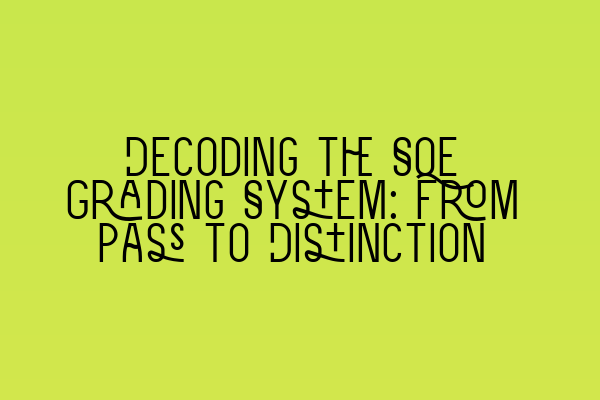Decoding the SQE Grading System: From Pass to Distinction
Aspiring solicitors who are preparing for the Solicitors Qualifying Examination (SQE) often wonder about the grading system and what it takes to achieve a higher distinction. Understanding the grading system is crucial to setting realistic goals and gaining a deeper insight into your performance. In this article, we will decode the SQE grading system, from pass to distinction, to help you navigate your way to success.
The Basics: Pass, Commendation, and Distinction
The SQE grading system consists of three categories: pass, commendation, and distinction. These categories provide an indication of the quality of your performance in specific areas of the examination.
1. Pass: A pass indicates that you have met the minimum requirements to demonstrate competency in the assessed skills and knowledge. It shows that you have a satisfactory understanding of the subject matter and are ready to proceed to the next stage of your solicitor training.
2. Commendation: A commendation is awarded to candidates who have achieved a higher level of performance, demonstrating not only competency but also a more advanced level of understanding and application of the knowledge and skills required for solicitor practice. It reflects a deeper understanding and critical analysis of the subject matter.
3. Distinction: The highest level of achievement, a distinction signifies an exceptional level of performance. It represents an outstanding understanding and application of the knowledge and skills required for solicitor practice. Candidates who achieve distinction have demonstrated a superior level of critical analysis, synthesis, and evaluation.
Grading Criteria and Weightage
The SQE grading system evaluates candidates based on specific criteria that vary depending on the individual assessments. The criteria may include elements such as legal knowledge, skills application, problem-solving abilities, legal reasoning, communication skills, and ethical considerations.
The weightage assigned to each criterion can also differ, depending on the particular assessment. While legal knowledge is an essential component, practical application and problem-solving skills may carry greater weight in certain assessments. It is important to have a comprehensive understanding of the assessment criteria to ensure you focus your preparation efforts accordingly.
Preparing for Success
To increase your chances of achieving a higher grade, thorough preparation is key. Below are some strategies to help you on your journey:
1. Understand the Assessment Format: Familiarize yourself with the assessment structure, question types, and time constraints. This will enable you to allocate your time effectively and approach each question with confidence.
2. Identify Strengths and Weaknesses: Assess your knowledge and skills to identify areas of strength and areas that require improvement. Devote more time and effort to strengthening weaker areas while reinforcing strengths.
3. Practice, Practice, Practice: Engage in regular practice, including solving past papers, participating in mock exams, and seeking feedback from experienced professionals. This will enhance your understanding of the assessment requirements and help you identify areas for improvement.
4. Seek Professional Guidance: Consider enrolling in professional training courses or workshops that focus on the specific areas being assessed. These programs can provide expert guidance, practical insights, and effective study strategies.
Related Resources
For further insights into specific legal topics and assistance in strengthening your knowledge and skills, we recommend the following articles:
- Legal Considerations in Residential Leases: Essential Insights for Solicitors
- Lease Laws in the UK: Unraveling the Legal Framework for Tenants
- Workshops on Land Law: Hands-On Training for Effective Practice
- Differences Between Commercial and Residential Property Laws: Examining Contrasting Regulations
- Interactive SQE Mock Tests for Property: Enhance Your Exam Performance
By exploring these resources, you can expand your knowledge, enhance your exam performance, and gain a competitive edge.
Achieving Your Goals
The SQE grading system is designed to provide a fair and comprehensive evaluation of candidates’ knowledge and skills. Understanding the grading criteria, focusing on targeted preparation, and utilizing available resources are essential steps on the path to success.
By dedicating yourself to consistent study, seeking professional guidance, and leveraging relevant resources, you can decode the SQE grading system and strive towards achieving commendation or even distinction. Remember, success is within your reach with the right mindset, preparation, and determination.

Leave a Reply